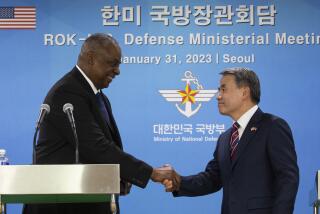In a Unified Korea--GIs
- Share via
TOKYO — The United States will maintain troops “permanently” in Japan and even in a future unified Korea as the core of a forward American presence in Asia, Deputy Defense Secretary William J. Perry said Thursday.
“Neither our adversaries nor our friends should mistake adjustments in our ground and air forces as a diminishment of U.S. commitment,” Perry declared in a news conference here.
It was the first time any American official has spoken of keeping U.S. troops in a unified Korea.
Last year, former President Roh Tae Woo became the first South Korean official to advocate that the United States keep its troops--now numbering 36,000--on the Korean Peninsula even after the Communist north and the capitalist south reunify, as they hope to do. Last March 5, South Korean Foreign Minister Han Sung Joo told The Times that his nation would seek to retain its American alliance after unification.
Perry, speaking to a conference organized by the Asia Society, did not spell out what duties would be assigned to American forces in a unified Korea, but his statement implied that they would play a new regional role.
Since the end of the 1950-53 Korean War, U.S. forces have been kept in South Korea only to deter an attack from North Korea, which has consistently demanded their withdrawal. The public in both the United States and South Korea had widely assumed the troops would go home when the threat disappeared.
By contrast, U.S. forces have used their bases in Japan to launch missions into the Indian Ocean and even to the Persian Gulf, as well as to provide an air shield against the former Soviet Union.
Now that American forces have been expelled from the Philippines, however, South Korea and Japan are the only Asian nations that welcome significant numbers of U.S. troops. About 50,000 Americans are based in Japan.
Perry said the troops will remain in Japan and Korea “as long as the governments and people (of the two countries) welcome them.”
He said the United States will seek to establish with its Asian allies “ad hoc coalitions,” such as the one during the Persian Gulf War against Iraq, to deal with regional threats. Joint peacekeeping operations with “our Asian allies and friends” also will be promoted, he said.
More to Read
Sign up for Essential California
The most important California stories and recommendations in your inbox every morning.
You may occasionally receive promotional content from the Los Angeles Times.










